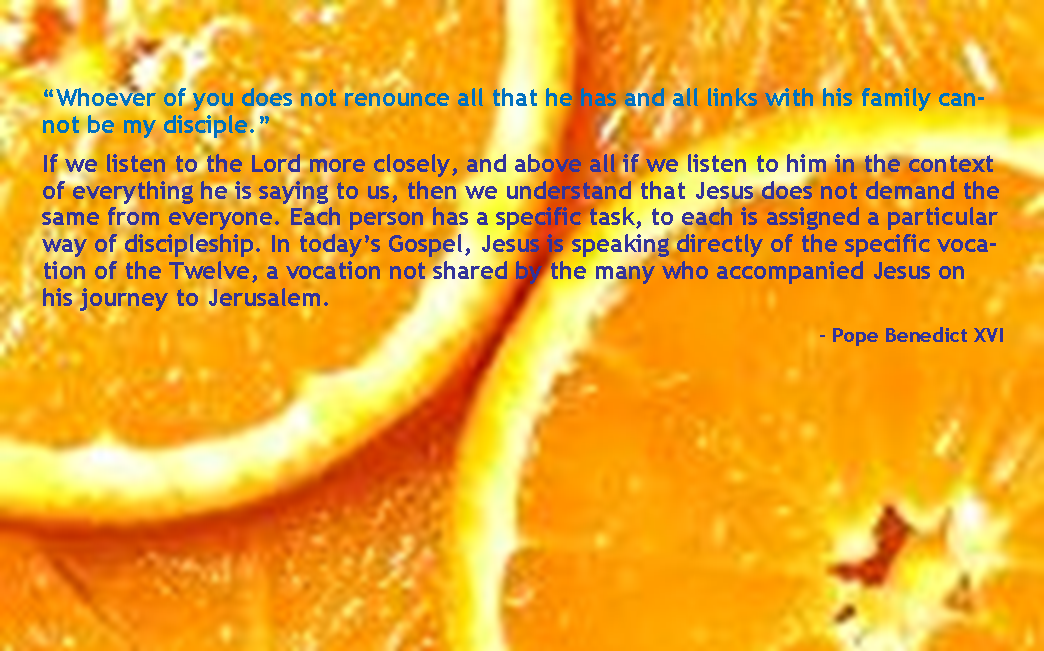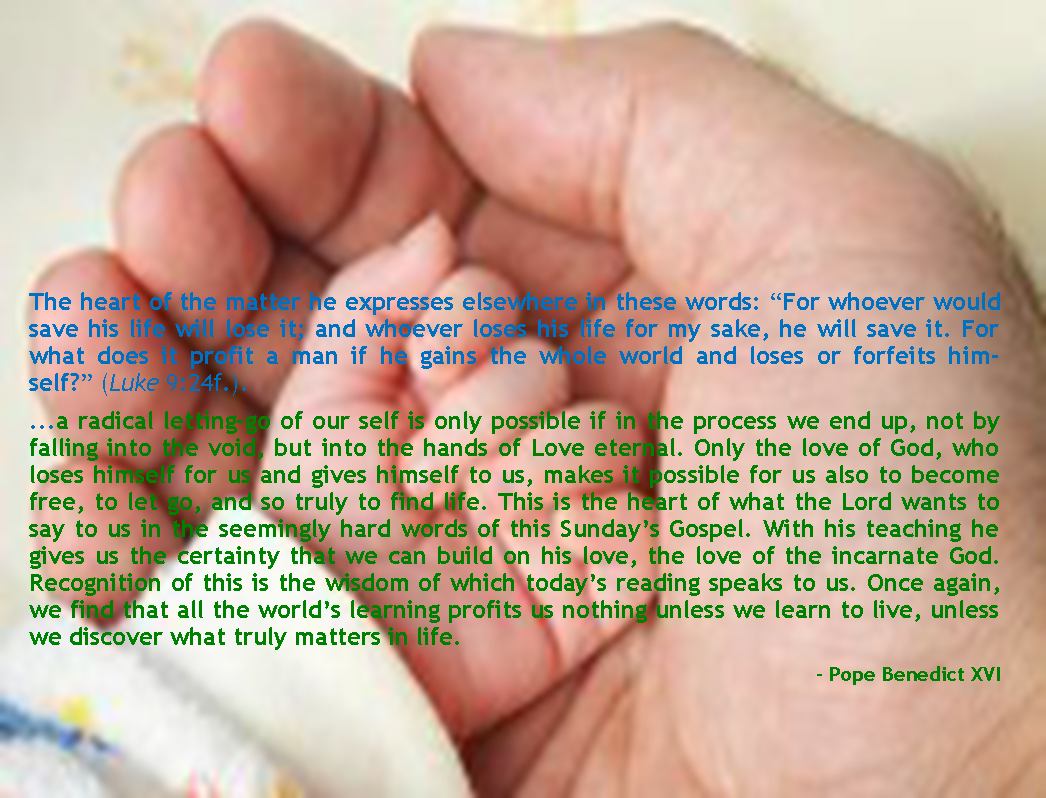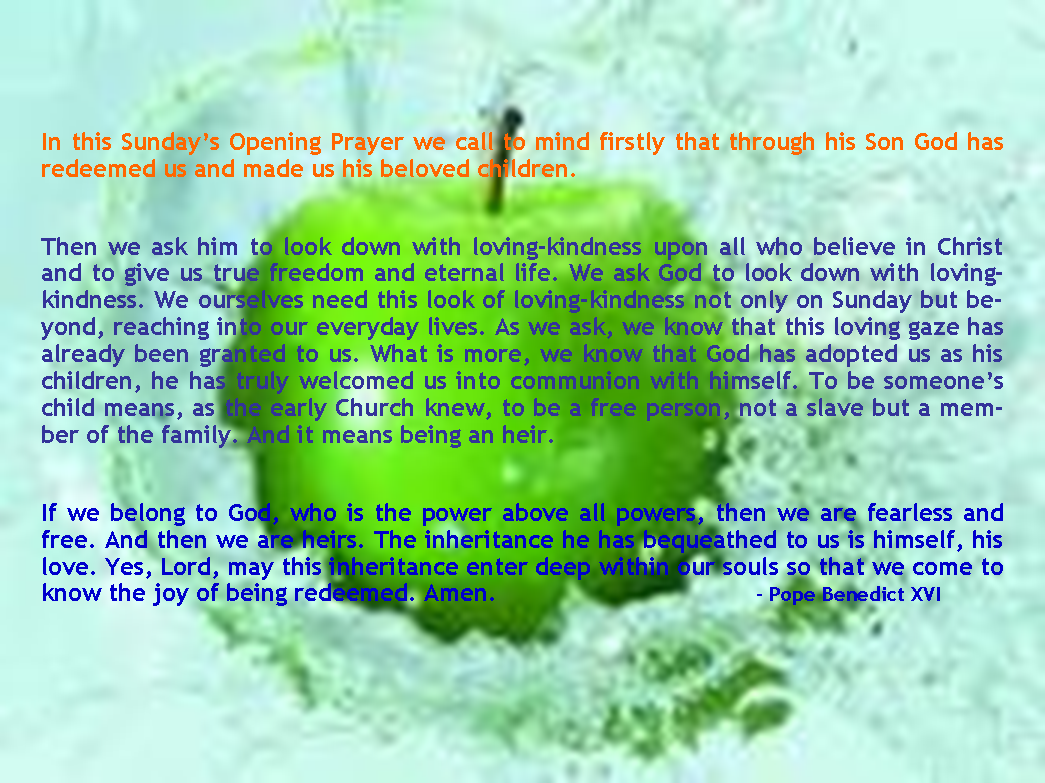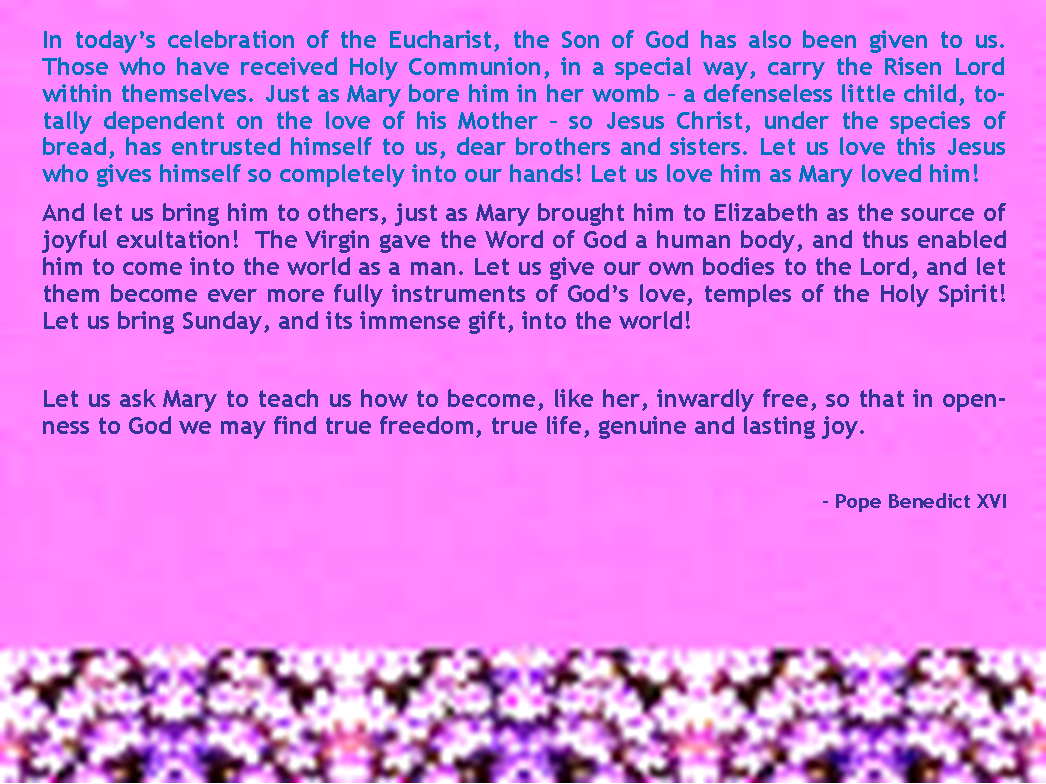|
52 |
|
7. Dear brothers and sisters, friends of Catholic Action who have gathered in Loreto from Italy, from Spain, from many parts of the world! Today, through the beatification of these three Servants of God, the Lord is saying to you: the greatest gift you can make to the Church and to the world is holiness.
May you have at heart what the Church has at heart: that numerous men and women of our time be won over by fascination for Christ; may his Gospel shine once more as a light of hope for the poor, the sick, those who hunger for justice; may Christian communities be ever more lively, open and attractive; may our cities be hospitable and livable for all; may humanity follow the paths of peace and brotherhood.
8. It is up to you lay people to witness to the faith through your own specific virtues: fidelity and gentleness in the family, competence at work, tenacity in serving the common good, solidarity in social relations, creativity in doing useful deeds for evangelization and human promotion. It is also up to you, in close communion with the Pastors, to show that the Gospel is timely and that faith does not tear the believer from history but roots him in it more deeply.
Courage, Catholic Action! May the Lord guide you on your journey of renewal!
May the Immaculate Virgin of Loreto accompany you with tender concern; the Church looks to you with confidence; the Pope greets you, supports you and wholeheartedly blesses you. Italian Catholic Action, thank you!
Acknowledgment: We thank the Vatican Publisher for allowing us to publish the Homily of Blessed Pope John Paul II, so that it could be accessed by more people all over the world; as a source of God’s encouragements to all of us. |

|
EUCHARISTIC CELEBRATION HOMILY OF HIS HOLINESS BENEDICT XVI Saint Stephen’s Cathedral, Vienna
Dear Brothers and Sisters,
“Sine dominico non possumus!” Without the gift of the Lord, without the Lord’s day, we cannot live: That was the answer given in the year 304 by Christians from Abitene in present-day Tunisia, when they were caught celebrating the forbidden Sunday Eucharist and brought before the judge. They were asked why they were celebrating the Christian Sunday Eucharist, even though they knew it was a capital offence. “Sine dominico non possumus”: in the word dominicum/dominico two meanings are inextricably intertwined, and we must once more learn to recognize their unity. First of all there is the gift of the Lord – this gift is the Lord himself: the Risen one, whom the Christians simply need to have close and accessible to them, if they are to be themselves. Yet this accessibility is not merely something spiritual, inward and subjective: the encounter with the Lord is inscribed in time on a specific day. And so it is inscribed in our everyday, corporal and communal existence, in temporality. It gives a focus, an inner order to our time and thus to the whole of our lives. For these Christians, the Sunday Eucharist was not a commandment, but an inner necessity. Without him who sustains our lives, life itself is empty. To do without or to betray this focus would deprive life of its very foundation, would take away its inner dignity and beauty.
Does this attitude of the Christians of that time apply also to us who are Christians today? Yes, it does, we too need a relationship that sustains us, that gives direction and content to our lives. We too need access to the Risen one, who sustains us through and beyond death. We need this encounter which brings us together, which gives us space for freedom, which lets us see beyond the bustle of everyday life to God’s creative love, from which we come and towards which we are travelling.
Of course, if we listen to today’s Gospel, if we listen to what the Lord is saying to us, it frightens us: “Whoever of you does not renounce all that he has and all links with his family cannot be my disciple.” We would like to object: What are you saying, Lord? Isn’t the family just what the world needs? Doesn’t it need the love of father and mother, the love between parents and children, between husband and wife? Don’t we need love for life, the joy of life? And don’t we also need people who invest in the good things of this world and build up the earth we have received, so that everyone can share in its gifts? Isn’t the development of the earth and its goods another charge laid upon us? If we listen to the Lord more closely, and above all if we listen to him in the context of everything he is saying to us, then we understand that Jesus does not demand the same from everyone. Each person has a specific task, to each is assigned a particular way of discipleship. In today’s Gospel, Jesus is speaking directly of the specific vocation of the Twelve, a vocation not shared by the many who accompanied Jesus on his journey to Jerusalem. The Twelve must first of all overcome the scandal of the Cross, and then they must be prepared truly to leave everything behind; they must be prepared to assume the seemingly absurd task of travelling to the ends of the earth and, with their minimal education, proclaiming the Gospel of Jesus Christ to a world filled with claims to erudition and with real or apparent education – and naturally also to the poor and the simple. They must themselves be prepared to suffer martyrdom in the course of their journey into the vast world, and thus to bear witness to the Gospel of the Crucified and Risen Lord. If Jesus’s words on this journey to Jerusalem, on which a great crowd accompanies him, are addressed in the first instance to the Twelve, his call naturally extends beyond the historical moment into all subsequent centuries. He calls people of all times to count exclusively on him, to leave everything else behind, so as to be totally available for him, and hence totally available for others: to create oases of selfless love in a world where so often only power and wealth seem to count for anything. Let us thank the Lord for giving us men and women in every century who have left all else behind for his sake, and have thus become radiant signs of his love. We need only think of people like Benedict and Scholastica, Francis and Clare of Assisi, Elizabeth of Hungary and Hedwig of Silesia, Ignatius of Loyola, Teresa of Avila, and in our own day, Mother Teresa and Padre Pio. With their whole lives, these people have become a living interpretation of Jesus’s teaching, which through their lives becomes close and intelligible to us. Let us ask the Lord to grant to people in our own day the courage to leave everything behind and so to be available to everyone. |

|
Yet if we now turn once more to the Gospel, we realize that the Lord is not speaking merely of a few individuals and their specific task; the essence of what he says applies to everyone. The heart of the matter he expresses elsewhere in these words: “For whoever would save his life will lose it; and whoever loses his life for my sake, he will save it. For what does it profit a man if he gains the whole world and loses or forfeits himself?” (Luke 9:24f.). Whoever wants to keep his life just for himself will lose it. Only by giving ourselves do we receive our life. In other words: only the one who loves discovers life. And love always demands going out of oneself, it always demands leaving oneself. Anyone who looks just to himself, who wants the other only for himself, will lose both himself and the other. Without this profound losing of oneself, there is no life. The restless craving for life, so widespread among people today, leads to the barrenness of a lost life. “Whoever loses his life for my sake … ”, says the Lord: a radical letting-go of our self is only possible if in the process we end up, not by falling into the void, but into the hands of Love eternal. Only the love of God, who loses himself for us and gives himself to us, makes it possible for us also to become free, to let go, and so truly to find life. This is the heart of what the Lord wants to say to us in the seemingly hard words of this Sunday’s Gospel. With his teaching he gives us the certainty that we can build on his love, the love of the incarnate God. Recognition of this is the wisdom of which today’s reading speaks to us. Once again, we find that all the world’s learning profits us nothing unless we learn to live, unless we discover what truly matters in life.
“Sine dominico non possumus!” Without the Lord and without the day that belongs to him, life does not flourish. Sunday has been transformed in our Western societies into the week-end, into leisure time. Leisure time is something good and necessary, especially amid the mad rush of the modern world; each of us knows this. Yet if leisure time lacks an inner focus, an overall sense of direction, then ultimately it becomes wasted time that neither strengthens nor builds us up. Leisure time requires a focus – the encounter with him who is our origin and goal. My great predecessor in the see of Munich and Freising, Cardinal Faulhaber, once put it like this: Give the soul its Sunday, give Sunday its soul. |

|
Because Sunday is ultimately about encountering the risen Christ in word and sacrament, its span extends through the whole of reality. The early Christians celebrated the first day of the week as the Lord’s day, because it was the day of the resurrection. Yet very soon, the Church also came to realize that the first day of the week is the day of the dawning of creation, the day on which God said: “Let there be light” (Genesis 1:3). Therefore Sunday is also the Church’s weekly feast of creation – the feast of thanksgiving and joy over God’s creation. At a time when creation seems to be endangered in so many ways through human activity, we should consciously advert to this dimension of Sunday too. Then, for the early Church, the first day increasingly assimilated the traditional meaning of the seventh day, the Sabbath. We participate in God’s rest, which embraces all of humanity. Thus we sense on this day something of the freedom and equality of all God’s creatures.
In this Sunday’s Opening Prayer we call to mind firstly that through his Son God has redeemed us and made us his beloved children. Then we ask him to look down with loving-kindness upon all who believe in Christ and to give us true freedom and eternal life. We ask God to look down with loving-kindness. We ourselves need this look of loving-kindness not only on Sunday but beyond, reaching into our everyday lives. As we ask, we know that this loving gaze has already been granted to us. What is more, we know that God has adopted us as his children, he has truly welcomed us into communion with himself. To be someone’s child means, as the early Church knew, to be a free person, not a slave but a member of the family. And it means being an heir. If we belong to God, who is the power above all powers, then we are fearless and free. And then we are heirs. The inheritance he has bequeathed to us is himself, his love. Yes, Lord, may this inheritance enter deep within our souls so that we come to know the joy of being redeemed. Amen.
Acknowledgment: We thank the Vatican Publisher for allowing us to publish the Homily of Pope Benedict XVI, so that it could be accessed by more people all over the world; as a source of God’s encouragements to all of us.
BENEDICT XVI ANGELUS Stephansplatz, Vienna
Dear Brothers and Sisters!
It was a particularly beautiful experience this morning to be able to celebrate the Lord’s Day with all of you in such a dignified and solemn manner in the magnificent Cathedral of Saint Stephen. The celebration of the Eucharist, carried out with due dignity, helps us to realize the immense grandeur of God’s gift to us in the Holy Mass. In this way, we also draw near to each another and experience the joy of God. So I thank all those who, by their active contribution to the preparation of the liturgy or by their recollected participation in the sacred mysteries, created an atmosphere in which we truly felt God’s presence. Heartfelt thanks and Vergelt’s Gott to all! |

|
In my homily I wished to say something about the meaning of Sunday and about today’s Gospel, and I think that this led us to discover that the love of God, who surrendered himself into our hands for our salvation, gives us the inner freedom to let go of our own lives, in order to find true life. Mary’s participation in this love gave her the strength to say “yes” unconditionally. In her encounter with the gentle, respectful love of God, who awaits the free cooperation of his creature in order to bring about his saving plan, the Blessed Virgin was able to overcome all hesitation and, in view of this great and unprecedented plan, to entrust herself into his hands. With complete availability, interior openness and freedom, she allowed God to fill her with love, with his Holy Spirit. Mary, the simple woman, could thus receive within herself the Son of God, and give to the world the Saviour who had first given himself to her.
Continue next page ...
15 September 2013
|